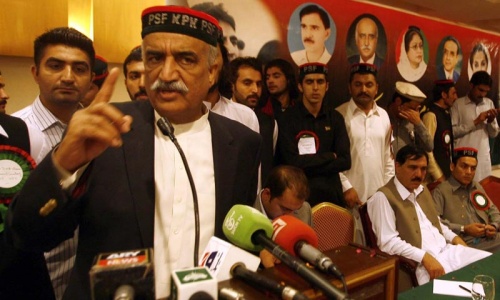WASHINGTON: Prime Minister Nawaz Sharif stressed on Tuesday the need to punish those responsible for toppling elected governments and introducing suicide bombings to the country.
He emphasised this point also in his address to the Pakistani community on Monday evening, asking his audience to single out those who introduced “the culture of suicide bombings, removed judges and toppled elected governments”.
And then he named former military ruler Pervez Musharraf as the man responsible for some of these “crimes”, recalling that he also “fell flat on his face” when the retired general came under pressure after 9/11.
His repeated emphasis on punishing military rulers is seen in Washington as a message to the US administration not to back Mr Musharraf who has been living in house-arrest since returning to Islamabad in March this year.
Mr Sharif said that Mr Musharraf not only toppled his government but also sacked judges.
He said that when he met US Secretary of State John Kerry on Sunday, he did not ask for money, which “surprised the Americans”.
In both the speeches, Mr Sharif recalled that he brought former Indian Prime Minister Atal Behari Vajpayee to Lahore and even got a pledge from him for resolving the Kashmir dispute. And in return, Gen Musharraf toppled his government.
“We have lost a lot of time. Centuries pay for a moment’s mistake,” Mr Sharif said while stressing the need for allowing democracy to flourish.
The prime minister also urged the nations not to blame others for its mistakes. “Instead of blaming others, we should identify those within our ranks who made these mistakes,” he said. The killings in Karachi and Quetta and the suicide bombings, he said, could not be blamed entirely on outside elements.
The prime minister said his government was following an “even-handed” approach in the operation in Karachi and was going after all those responsible for the violence. “Nobody has been spared for his party affiliations,” he said.
“We shouldn’t allow such criminals to go free, they should be punished severely,” he said.
“The new law will come in the next few days and will play a key role in reducing crime.”
The prime minister defended his decision to engage the Taliban in peace talks, saying that “if Britain could do that in Northern Ireland, why not Pakistan”.
Mr Sharif claimed there was no corruption in his government. “We will not tolerate any corruption as we want to set a new example.”
The prime minister said the situation forced him to raise electricity tariff. “I was ‘bahut majboor’ or I would not have done it,” he said. “I understand it has created a lot of difficulties for the poor but we will provide them new reliefs.”
Mr Sharif urged overseas Pakistanis to invest in the energy sector, telling them that it will not only help the country but would also bring “rich dividends”.
The prime minister said his government would bring another law, removing all discrimination against overseas Pakistanis.
“They are all patriotic Pakistanis, even those who have double or triple nationalities,” he said. “Some of them are more concerned about Pakistan than those living inside the country."














































